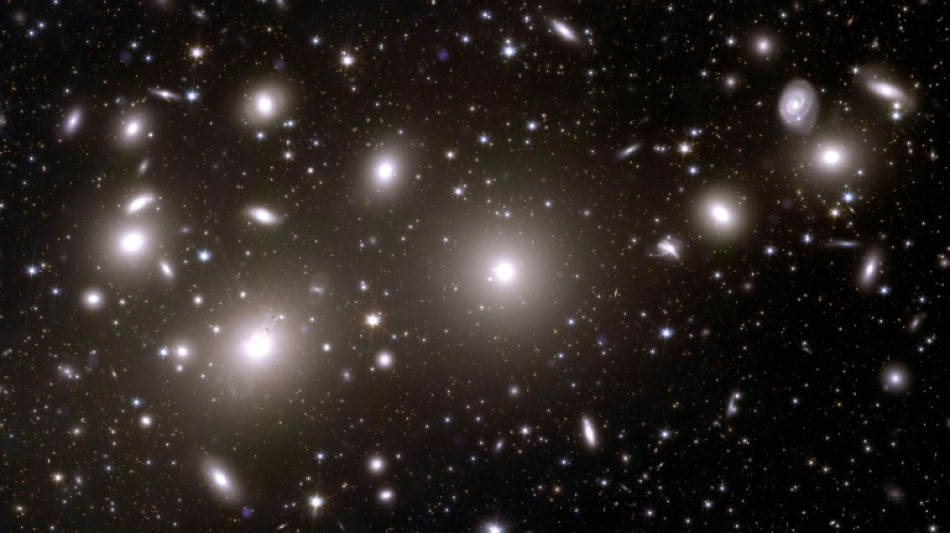
-
 Liverpool's Slot says 'no issue to resolve' with Salah after outburst
Liverpool's Slot says 'no issue to resolve' with Salah after outburst
-
'Stop the slaughter': French farmers block roads over cow disease cull

-
 Stormers see off La Rochelle, Sale stun Clermont in Champions Cup
Stormers see off La Rochelle, Sale stun Clermont in Champions Cup
-
Maresca hails Palmer as Chelsea return to winning ways against Everton

-
 Hungarian protesters demand Orban quits over abuse cases
Hungarian protesters demand Orban quits over abuse cases
-
Belarus frees protest leader Kolesnikova, Nobel winner Bialiatski

-
 Salah sets up goal on return to Liverpool action
Salah sets up goal on return to Liverpool action
-
Palmer strikes as Chelsea return to winning ways against Everton

-
 Pogacar targets Tour de France Paris-Roubaix and Milan-San Remo in 2026
Pogacar targets Tour de France Paris-Roubaix and Milan-San Remo in 2026
-
Salah back in action for Liverpool after outburst

-
 Atletico recover Liga momentum with battling win over Valencia
Atletico recover Liga momentum with battling win over Valencia
-
Meillard leads 'perfect' Swiss sweep in Val d'Isere giant slalom

-
 Salah on Liverpool bench for Brighton match
Salah on Liverpool bench for Brighton match
-
Meillard leads Swiss sweep in Val d'Isere giant slalom

-
 Indonesia flood death toll passes 1,000 as authorities ramp up aid
Indonesia flood death toll passes 1,000 as authorities ramp up aid
-
Cambodia shuts Thailand border crossings over deadly fighting

-
 First urban cable car unveiled outside Paris
First urban cable car unveiled outside Paris
-
Vonn second behind Aicher in World Cup downhill at St Moritz

-
 Aicher pips Vonn to downhill win at St Moritz
Aicher pips Vonn to downhill win at St Moritz
-
Thailand says 4 soldiers killed in Cambodia conflict, denies Trump truce claim

-
 Fans vandalise India stadium after Messi's abrupt exit
Fans vandalise India stadium after Messi's abrupt exit
-
Women sommeliers are cracking male-dominated wine world open

-
 Exhibition of Franco-Chinese print master Zao Wou-Ki opens in Hong Kong
Exhibition of Franco-Chinese print master Zao Wou-Ki opens in Hong Kong
-
Myanmar junta denies killing civilians in hospital strike

-
 Why SpaceX IPO plan is generating so much buzz
Why SpaceX IPO plan is generating so much buzz
-
Thailand continues Cambodia strikes despite Trump truce calls

-
 US envoy to meet Zelensky, Europe leaders in Berlin this weekend
US envoy to meet Zelensky, Europe leaders in Berlin this weekend
-
North Korea acknowledges its troops cleared mines for Russia

-
 US unseals warrant for tanker seized off Venezuelan coast
US unseals warrant for tanker seized off Venezuelan coast
-
Cambodia says Thailand still bombing hours after Trump truce call

-
 Machado urges pressure so Maduro understands 'he has to go'
Machado urges pressure so Maduro understands 'he has to go'
-
Leinster stutter before beating Leicester in Champions Cup

-
 World stocks mostly slide, consolidating Fed-fuelled gains
World stocks mostly slide, consolidating Fed-fuelled gains
-
Crypto firm Tether bids for Juventus, is quickly rebuffed

-
 Union sink second-placed Leipzig to climb in Bundesliga
Union sink second-placed Leipzig to climb in Bundesliga
-
US Treasury lifts sanctions on Brazil Supreme Court justice

-
 UK king shares 'good news' that cancer treatment will be reduced in 2026
UK king shares 'good news' that cancer treatment will be reduced in 2026
-
Wembanyama expected to return for Spurs in NBA Cup clash with Thunder

-
 Five takeaways from Luigi Mangione evidence hearings
Five takeaways from Luigi Mangione evidence hearings
-
UK's king shares 'good news' that cancer treatment will be reduced in 2026

-
 Steelers' Watt undergoes surgery to repair collapsed lung
Steelers' Watt undergoes surgery to repair collapsed lung
-
Iran detains Nobel-prize winner in 'brutal' arrest

-
 NBA Cup goes from 'outside the box' idea to smash hit
NBA Cup goes from 'outside the box' idea to smash hit
-
UK health service battles 'super flu' outbreak

-
 Can Venezuela survive US targeting its oil tankers?
Can Venezuela survive US targeting its oil tankers?
-
Democrats release new cache of Epstein photos

-
 Colombia's ELN guerrillas place communities in lockdown citing Trump 'intervention' threats
Colombia's ELN guerrillas place communities in lockdown citing Trump 'intervention' threats
-
'Don't use them': Tanning beds triple skin cancer risk, study finds

-
 Nancy aims to restore Celtic faith with Scottish League Cup final win
Nancy aims to restore Celtic faith with Scottish League Cup final win
-
Argentina fly-half Albornoz signs for Toulon until 2030


Dark energy seems to be changing, rattling our view of universe
Dark energy, the mysterious force thought to be driving the ever-faster expansion of the universe, appears to be changing over time, according to new observations released Wednesday.
If dark energy is in fact weakening, it would likely mean that science's understanding of how the universe works will need to be rewritten.
The new findings come from the Dark Energy Spectroscopic Instrument (DESI), which sits on a telescope at the Kitt Peak National Observatory in the US state of Arizona.
"What we are seeing is deeply intriguing," said Alexie Leauthaud-Harnett, a spokesperson for the DESI collaboration which brings together 70 institutions across the world.
"It is exciting to think that we may be on the cusp of a major discovery about dark energy and the fundamental nature of our universe," she said in a statement.
The DESI instrument's thin optical fibres can simultaneously observe 5,000 galaxies or quasars -- blazing monsters with a black hole at their heart -- for 20 minutes.
This allows scientists to calculate the age and distance of these objects, and create a map of the universe so they can detect patterns and trace its history.
- 'Tensions' emerging -
Scientists have known for a century that the universe is expanding, because massive clusters of galaxies have been observed moving away from each other.
In the late 1990s, scientists shocked the field by discovering that the universe's expansion has been speeding up over time.
The name dark energy was given to the phenomenon driving this acceleration, the effects of which seem to be partially offset by ordinary matter -- and an also unknown thing called dark matter.
The universe is thought to be made of 70 percent dark energy, 25 percent dark matter -- and just five percent normal matter.
Science's best understanding of how the universe works, which is called the standard cosmological model, refers to dark energy as being constant -- meaning it does not change.
The idea was first introduced by Albert Einstein in his theory of relativity.
Arnaud de Mattia, a French physicist involved in analysing the DESI data, told AFP that the standard model is "satisfactory" but some "tensions" are emerging between observations.
There are several different ways of measuring the expansion of the universe, including looking at the lingering radiation from after the Big Bang, exploding stars called supernovae and how gravity distorts the light of galaxies.
When the DESI team combined their new data with other measurements, they found "signs that the impact of dark energy may be weakening over time", according to a statement.
"When we combine all the cosmological data, it favours that the universe's expansion was accelerating at a slightly higher rate around seven billion years ago," de Mattia said.
But for the moment there is "absolutely not certainty" about this, he added.
- 'Inflection point' -
French physicist Etienne Burtin was confident that "we should have a clearer picture within five years".
This is because there is loads of new data expected from DESI, Europe's Euclid space telescope, NASA's upcoming Nancy Grace Roman space telescope and the Vera Rubin Observatory in Chile.
"This new generation of surveys -- in the next few years -- will nail this," Joshua Frieman, a theoretical astrophysicist at the University of Chicago, told AFP.
But for now, "we're at this interesting inflection point", added Frieman, a dark energy expert and former DESI member.
Burtin said confirming the "evolving dark energy" theory would be a "revolution on the level of the discovery of accelerated expansion", which itself was the subject of a physics Nobel.
"The standard cosmological model would have to be different," he added.
The DESI research, which involved three years' worth of observations of 15 million galaxies and quasars, was presented at a conference of the American Physical Society in California.
Z.AbuSaud--SF-PST



